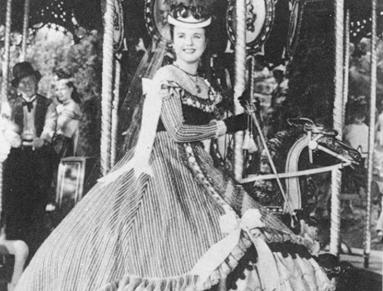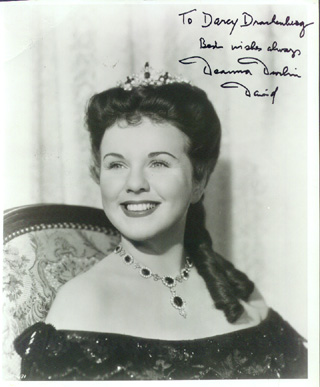Up in Central Park
1948
 Technical
Information:
Technical
Information:
Studio: Universal-International
Running Time: 1 hour, 28 minutes
Black and White
Video Availability: Available on MCA/Universal home video.
Cast:
Deanna Durbin...Rosie Moore
Dick Haymes...John Matthews
Vincent Price...Boss Tweed
Albert Sharpe...Timothy Moore
Tom Powers...Rogan
Hobart Cavanaugh...Mayor Oakley
Thurston Hall...Governor Motley
Howard Freeman...Myron Schultz
Mary Field...Miss Murch
Tom Pedi...O'Toole
Moroni Olsen...Big Jim Fitts
William Skipper...Dancer
Nelle Fisher...Dancer
Credits:
Based on the Musical Play "Up in Central Park" by...Herbert Fields,
Dorothy Fields, Sigmund Romberg
Produced by...Michael Todd
Music Arranged and Directed by...Johnny Green
Dances and Musical Sequences Staged by...Helen Tamiris
Production Designed by...Howard Bay
Director of Photography...Milton Krasner, A.S.C.
Costumes...Mary Grant
Film Editor...Otto Ludwig
Sound...Leslie I. Carey, Joe Lapis
Set Decorations...Russell A. Gausman, Ted Offenbecker
Hair Stylist...Carmen Dirigo
Make-Up...Bud Westmore
Assistant Director...William Holland
Special Photography...David S. Horsley, A.S.C.
Produced and Written for the Screen by...Karl Tunberg
Directed by...William A. Seiter

There is trouble in New York. Oakley (Hobart Cavanaugh)
is the mayor of New York City, and is running for re-election. William
Marcy "Boss" Tweed (Vincent Price) is in charge of his campaign, and has
practically complete control over the government. He is the head
of the Tammany Hall political machine, and is very corrupt. He is
involved in all sorts of illegal activities, including embezzlement.
He is troubled by a young reporter for the New York Times named John Matthews
(Dick Haymes). He suspects that something is wrong, and has been
writing about his suspicions in a series of articles published in the newspaper.
Boss Tweed doesn't like him at all, and wants him to stop.
Everyone expects Mayor Oakley to be re-elected.
But just to make sure, Boss Tweed decides to buy votes from unknowing people
- convicts and immigrants. That way, he will surely stay in power.
Rosie Moore (Deanna Durbin) and her father Timothy
(Albert Sharpe) are coming to America from Ireland. Rosie's mother
is dead, and she hopes to have a better life in the U.S. Her dream
is to become an opera singer, and her father simply wishes to continue
working since he can't read. They are easy targets for Boss Tweed.
As soon as they step off the boat, one of Tweed's employees manages to
buy 23 votes from Timothy, at $2 apiece. He gives Rosie and Timothy
a free cab ride to the polls where everyone is celebrating Oakley's win.
Rosie sees a picture of Tweed and is fascinated by it, even though she
hears that he is married. She goes up to Tweed's meeting room, and
falls asleep on a sofa.
Now that Oakley has been voted into office again,
Boss Tweed is planning a new project - a complete revision of Central Park
(which doesn't even need revision). In order to carry out the project,
they need to appoint a Superintendent of the park, a sort of stooge who
won't know what's going on. Tweed suddenly notices that Rosie is
asleep on the couch. Afraid that she might have heard their corrupt
plan, they decide to appoint her father as Superintendent, at a salary
of $3,000 a year with living accomodations. Timothy is bewildered
at first, but decides to take the job.
The Moores soon move into Central Park. Rosie
enjoys going for walks through the parks in the morning, and while on such
an excursion, meets John Matthews. They ride together on the carousel
and have a good time before Rosie departs.
Timothy enjoys his job, especially feeding the animals.
One day, while he is feeding the animals, Timothy meets John Matthews.
They start talking and Matthews finds out that the animals in the Central
Park Zoo are raised for Boss Tweed to eat! Matthews soon writes a
story about this, and it gets published in the Times. Boss Tweed
is angry that Timothy talked to Matthews and fires him. Outraged,
Rosie goes to see Matthews at his office and slaps him in the face.
Meanwhile, revisions on the park continue.
Tweed and his cronies charge themselves $50 for bags of grass seed that
normally sell for $5. They then pocket the difference. Rosie
sees Tweed again and is charmed by him. They make a dinner date.
That night, Matthews goes to the Moores' home to
apologize to them. In order to make it up to Timothy for getting
him fired, Matthews offers him a job at the Times. Timothy refuses
the job. Matthews and Rosie have a talk. She doesn't understand
why Matthews is against Boss Tweed, since he has done so much for her and
her father. Matthews tries to explain, and they end up kissing.
They realize that they are in love. Their romantic moment is interrupted
by a carriageman who has come to fetch Rosie for her date with Tweed.
When Matthews finds out they are having dinner together, he gets mad.
Rosie goes to Tweed's house to eat, and he is upset
when he finds out that she invited her father as well! They start
talking, and the conversation soon turns to Matthews. Rosie defends
him from Tweed's comments. They decide that the only way they can
get along is by persuading Matthews to see Tweed's point of view.
They arrange a meeting at a restaurant.
Matthews is happy to see Rosie again, but is upset
when Tweed arrives. Tweed offers Matthews a book deal, but he doesn't
want any part of it and leaves, which angers Rosie. Tweed then tells
her that he managed to get her an audition for an opera company.
Rosie is determined to be "somebody" and buys a
whole new wardrobe. She doesn't know it, but her father is secretly
taking reading lessons with a teacher named Miss Murch (Mary Field).
Matthews follows him to one of his classes, and confronts him when it is
finished. He tells Timothy that Rosie is only going to end up in
trouble if she continues seeing Tweed. Matthews says that Tweed's
ring is going to break apart and that all honest people in the city of
New York don't care for him at all. This is backed up by Miss Murch,
who tells Timothy that Tweed is a very corrupt man.
At home, Timothy tells Rosie that Tweed is bad.
They get in an argument and Rosie storms off to her audition, against her
father's wishes. He only wants Rosie to stay away from Tweed.
Tweed is present at the audition and manages to wangle a role for her in
the opera company's production of "La Traviata" the next week. They
celebrate her getting a role by going to Tweed's lodge.
Meanwhile, in Central Park, Timothy is depressed.
He talks with Matthews again, and tells him he is going to quit his job
as Superintendent. He also apologizes for not seeing how bad Tweed
was before. They realize that he must be exposed, and so they hatch
a plan. They break into City Hall in order to access financial records
but before they can get to the records, they hear a noise and hide in the
Mayor's office. The noise turns out to be Mayor Oakley, drunk, going
to his office late. The Mayor finds them hiding in his office.
Matthews does some quick talking and makes up a lie that Tweed is planning
on running another candidate in the next mayorial race. This convinces
Oakley to show Matthews and Timothy the records and thus, expose Tweed.
In the middle of the festivities at Tweed's lodge,
someone brings in the morning newspaper. The headlines scream about
Tweed's corrupt ways. All of his cronies leave, for fear of being
arrested. Rosie now realizes that she was wrong, and that Matthews
and her father were right. Her dreams of becoming an opera star are
smashed for now. She leaves the lodge and goes to the park where
she finds her father and Matthews. She apologizes to them, and they forgive
her. Everything is all right.

Songs:
[Songs performed by Deanna Durbin in boldface]
"Oh Say Can You See" (Romberg, Fields)
"Carousel in the Park" (Romberg, Fields)
"When She Walks in the Room" (Romberg, Fields)
"Pace, Pace Mio Dio" (Verdi)
Reviews:
Up in Central Park "...abounds in the colorful atmosphere of
the New York of the [1880s]."
- Hollywood Reporter
My Review:
Up in Central Park is my least favorite Deanna
film. The movie has a good plot, but it is rather slow-moving and
the songs are not memorable at all. The flow of the film (however
slow it is) is interrupted by two unnecessary (and rather unimpressive)
dance numbers. The only things going for it are the gorgeous costumes
and intricate sets, though they would've sparkled more had this been filmed
in color. It is a shame that Up in Central Park wasn't filmed
in color, since it would've helped it a lot. All in all, a disappointing
film and definitely not worthy of Deanna's talents.
Picture credits:
1. Video cover scanned by webmaster.
2. Movie still scanned by webmaster.
3. Publicity still courtesy of D'Arcy.
Filmography | Home
| Next Film
This page hosted by  Get your own Free Home Page
Get your own Free Home Page

 Technical
Information:
Technical
Information:

